Importance and Value of Operational Management in Achieving Business Objectives
VerifiedAdded on 2023/01/10
|13
|3686
|97
AI Summary
This article discusses the importance and value of operational management in achieving business objectives. It explores how operational management contributes to employee performance and reduces production costs. The roles of managers and leaders in implementing lean production and total quality management approaches are also discussed.
Contribute Materials
Your contribution can guide someone’s learning journey. Share your
documents today.
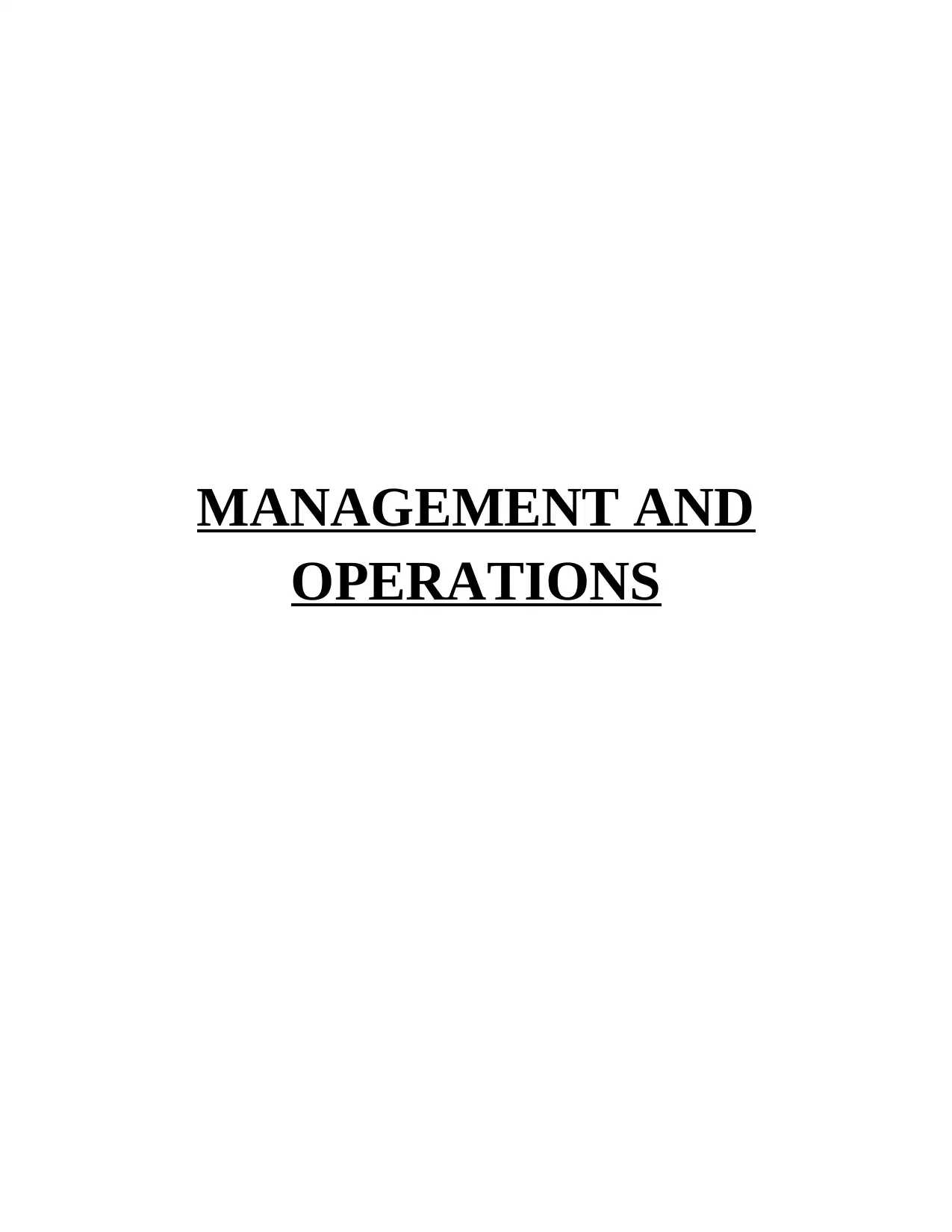
MANAGEMENT AND
OPERATIONS
OPERATIONS
Secure Best Marks with AI Grader
Need help grading? Try our AI Grader for instant feedback on your assignments.
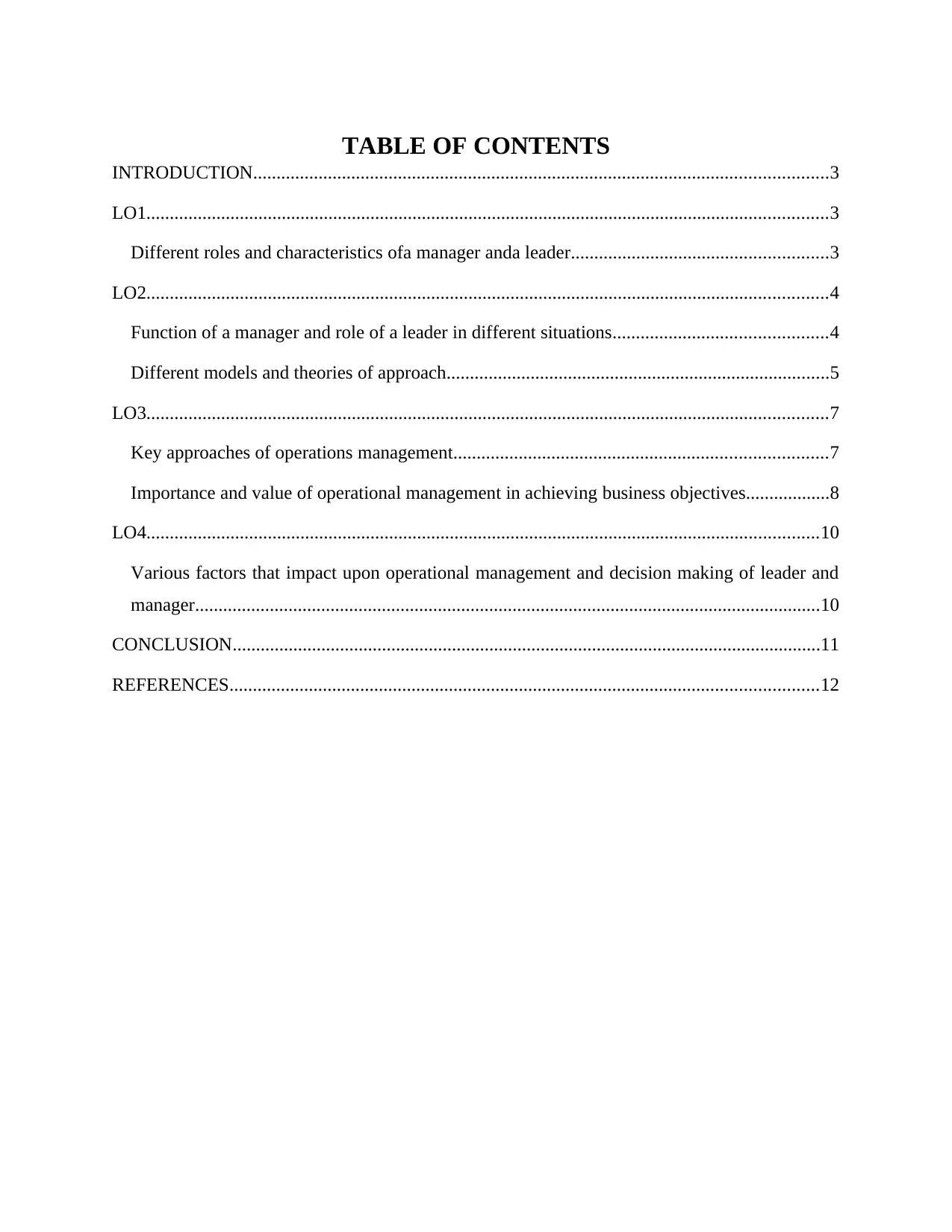
TABLE OF CONTENTS
INTRODUCTION...........................................................................................................................3
LO1..................................................................................................................................................3
Different roles and characteristics ofa manager anda leader.......................................................3
LO2..................................................................................................................................................4
Function of a manager and role of a leader in different situations..............................................4
Different models and theories of approach..................................................................................5
LO3..................................................................................................................................................7
Key approaches of operations management................................................................................7
Importance and value of operational management in achieving business objectives..................8
LO4................................................................................................................................................10
Various factors that impact upon operational management and decision making of leader and
manager......................................................................................................................................10
CONCLUSION..............................................................................................................................11
REFERENCES..............................................................................................................................12
INTRODUCTION...........................................................................................................................3
LO1..................................................................................................................................................3
Different roles and characteristics ofa manager anda leader.......................................................3
LO2..................................................................................................................................................4
Function of a manager and role of a leader in different situations..............................................4
Different models and theories of approach..................................................................................5
LO3..................................................................................................................................................7
Key approaches of operations management................................................................................7
Importance and value of operational management in achieving business objectives..................8
LO4................................................................................................................................................10
Various factors that impact upon operational management and decision making of leader and
manager......................................................................................................................................10
CONCLUSION..............................................................................................................................11
REFERENCES..............................................................................................................................12
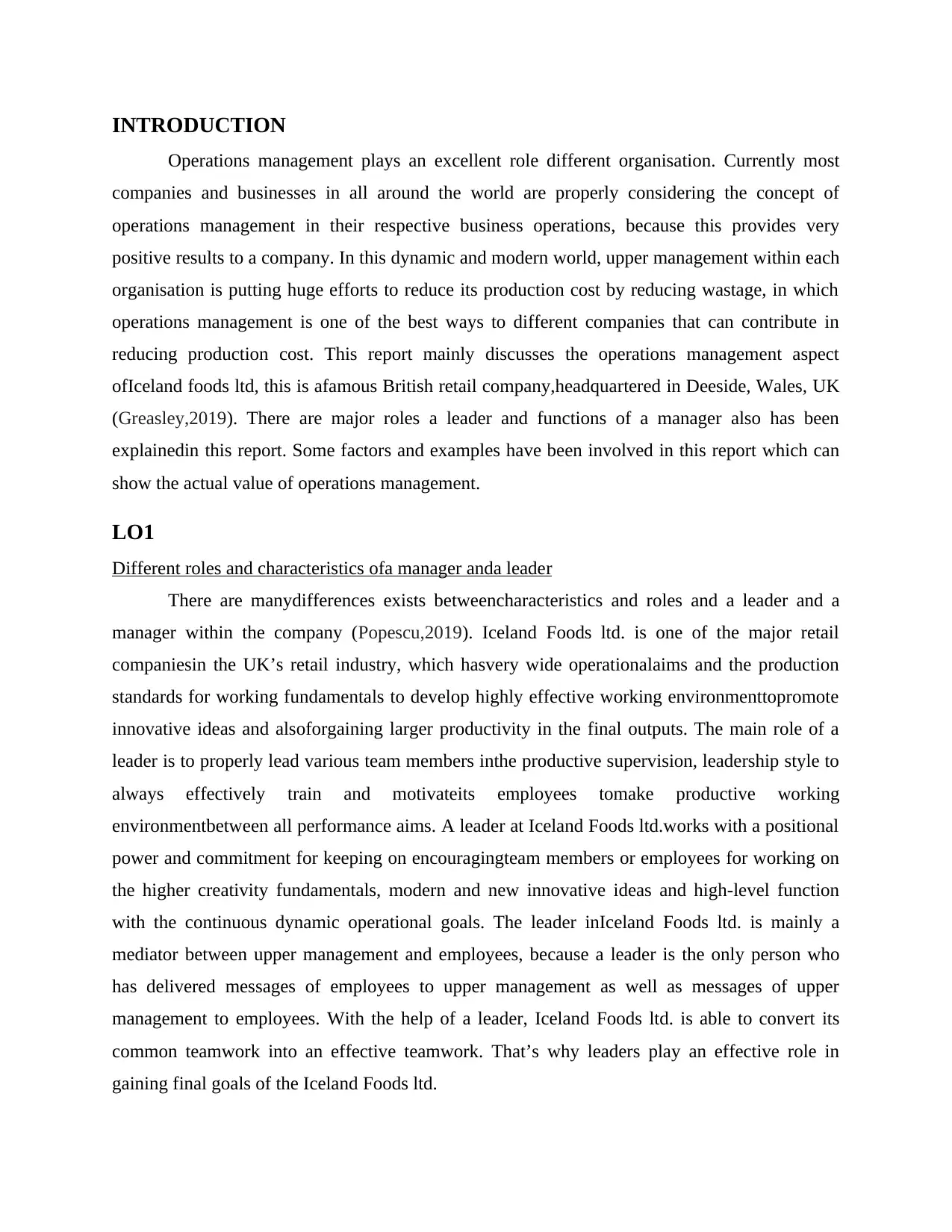
INTRODUCTION
Operations management plays an excellent role different organisation. Currently most
companies and businesses in all around the world are properly considering the concept of
operations management in their respective business operations, because this provides very
positive results to a company. In this dynamic and modern world, upper management within each
organisation is putting huge efforts to reduce its production cost by reducing wastage, in which
operations management is one of the best ways to different companies that can contribute in
reducing production cost. This report mainly discusses the operations management aspect
ofIceland foods ltd, this is afamous British retail company,headquartered in Deeside, Wales, UK
(Greasley,2019). There are major roles a leader and functions of a manager also has been
explainedin this report. Some factors and examples have been involved in this report which can
show the actual value of operations management.
LO1
Different roles and characteristics ofa manager anda leader
There are manydifferences exists betweencharacteristics and roles and a leader and a
manager within the company (Popescu,2019). Iceland Foods ltd. is one of the major retail
companiesin the UK’s retail industry, which hasvery wide operationalaims and the production
standards for working fundamentals to develop highly effective working environmenttopromote
innovative ideas and alsoforgaining larger productivity in the final outputs. The main role of a
leader is to properly lead various team members inthe productive supervision, leadership style to
always effectively train and motivateits employees tomake productive working
environmentbetween all performance aims. A leader at Iceland Foods ltd.works with a positional
power and commitment for keeping on encouragingteam members or employees for working on
the higher creativity fundamentals, modern and new innovative ideas and high-level function
with the continuous dynamic operational goals. The leader inIceland Foods ltd. is mainly a
mediator between upper management and employees, because a leader is the only person who
has delivered messages of employees to upper management as well as messages of upper
management to employees. With the help of a leader, Iceland Foods ltd. is able to convert its
common teamwork into an effective teamwork. That’s why leaders play an effective role in
gaining final goals of the Iceland Foods ltd.
Operations management plays an excellent role different organisation. Currently most
companies and businesses in all around the world are properly considering the concept of
operations management in their respective business operations, because this provides very
positive results to a company. In this dynamic and modern world, upper management within each
organisation is putting huge efforts to reduce its production cost by reducing wastage, in which
operations management is one of the best ways to different companies that can contribute in
reducing production cost. This report mainly discusses the operations management aspect
ofIceland foods ltd, this is afamous British retail company,headquartered in Deeside, Wales, UK
(Greasley,2019). There are major roles a leader and functions of a manager also has been
explainedin this report. Some factors and examples have been involved in this report which can
show the actual value of operations management.
LO1
Different roles and characteristics ofa manager anda leader
There are manydifferences exists betweencharacteristics and roles and a leader and a
manager within the company (Popescu,2019). Iceland Foods ltd. is one of the major retail
companiesin the UK’s retail industry, which hasvery wide operationalaims and the production
standards for working fundamentals to develop highly effective working environmenttopromote
innovative ideas and alsoforgaining larger productivity in the final outputs. The main role of a
leader is to properly lead various team members inthe productive supervision, leadership style to
always effectively train and motivateits employees tomake productive working
environmentbetween all performance aims. A leader at Iceland Foods ltd.works with a positional
power and commitment for keeping on encouragingteam members or employees for working on
the higher creativity fundamentals, modern and new innovative ideas and high-level function
with the continuous dynamic operational goals. The leader inIceland Foods ltd. is mainly a
mediator between upper management and employees, because a leader is the only person who
has delivered messages of employees to upper management as well as messages of upper
management to employees. With the help of a leader, Iceland Foods ltd. is able to convert its
common teamwork into an effective teamwork. That’s why leaders play an effective role in
gaining final goals of the Iceland Foods ltd.
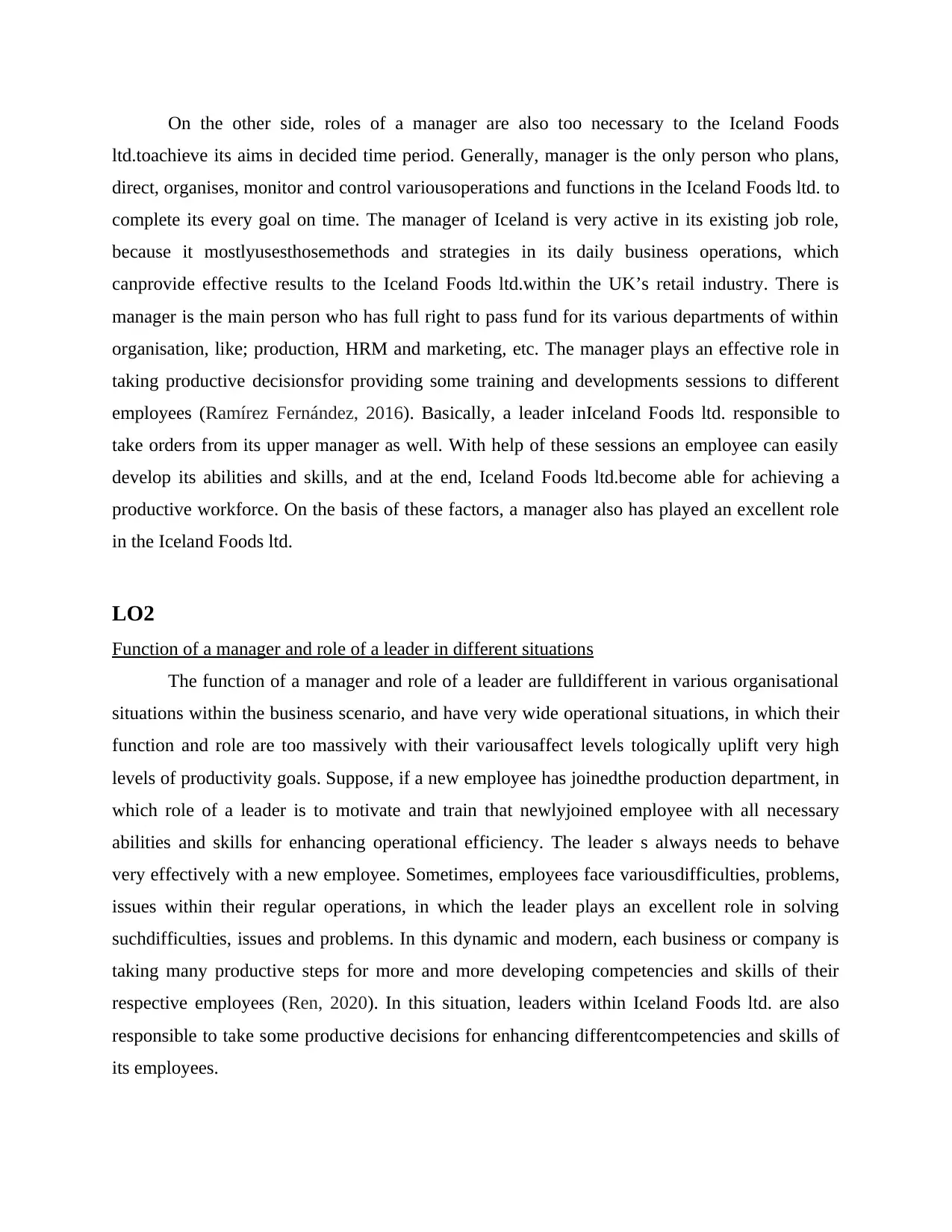
On the other side, roles of a manager are also too necessary to the Iceland Foods
ltd.toachieve its aims in decided time period. Generally, manager is the only person who plans,
direct, organises, monitor and control variousoperations and functions in the Iceland Foods ltd. to
complete its every goal on time. The manager of Iceland is very active in its existing job role,
because it mostlyusesthosemethods and strategies in its daily business operations, which
canprovide effective results to the Iceland Foods ltd.within the UK’s retail industry. There is
manager is the main person who has full right to pass fund for its various departments of within
organisation, like; production, HRM and marketing, etc. The manager plays an effective role in
taking productive decisionsfor providing some training and developments sessions to different
employees (Ramírez Fernández, 2016). Basically, a leader inIceland Foods ltd. responsible to
take orders from its upper manager as well. With help of these sessions an employee can easily
develop its abilities and skills, and at the end, Iceland Foods ltd.become able for achieving a
productive workforce. On the basis of these factors, a manager also has played an excellent role
in the Iceland Foods ltd.
LO2
Function of a manager and role of a leader in different situations
The function of a manager and role of a leader are fulldifferent in various organisational
situations within the business scenario, and have very wide operational situations, in which their
function and role are too massively with their variousaffect levels tologically uplift very high
levels of productivity goals. Suppose, if a new employee has joinedthe production department, in
which role of a leader is to motivate and train that newlyjoined employee with all necessary
abilities and skills for enhancing operational efficiency. The leader s always needs to behave
very effectively with a new employee. Sometimes, employees face variousdifficulties, problems,
issues within their regular operations, in which the leader plays an excellent role in solving
suchdifficulties, issues and problems. In this dynamic and modern, each business or company is
taking many productive steps for more and more developing competencies and skills of their
respective employees (Ren, 2020). In this situation, leaders within Iceland Foods ltd. are also
responsible to take some productive decisions for enhancing differentcompetencies and skills of
its employees.
ltd.toachieve its aims in decided time period. Generally, manager is the only person who plans,
direct, organises, monitor and control variousoperations and functions in the Iceland Foods ltd. to
complete its every goal on time. The manager of Iceland is very active in its existing job role,
because it mostlyusesthosemethods and strategies in its daily business operations, which
canprovide effective results to the Iceland Foods ltd.within the UK’s retail industry. There is
manager is the main person who has full right to pass fund for its various departments of within
organisation, like; production, HRM and marketing, etc. The manager plays an effective role in
taking productive decisionsfor providing some training and developments sessions to different
employees (Ramírez Fernández, 2016). Basically, a leader inIceland Foods ltd. responsible to
take orders from its upper manager as well. With help of these sessions an employee can easily
develop its abilities and skills, and at the end, Iceland Foods ltd.become able for achieving a
productive workforce. On the basis of these factors, a manager also has played an excellent role
in the Iceland Foods ltd.
LO2
Function of a manager and role of a leader in different situations
The function of a manager and role of a leader are fulldifferent in various organisational
situations within the business scenario, and have very wide operational situations, in which their
function and role are too massively with their variousaffect levels tologically uplift very high
levels of productivity goals. Suppose, if a new employee has joinedthe production department, in
which role of a leader is to motivate and train that newlyjoined employee with all necessary
abilities and skills for enhancing operational efficiency. The leader s always needs to behave
very effectively with a new employee. Sometimes, employees face variousdifficulties, problems,
issues within their regular operations, in which the leader plays an excellent role in solving
suchdifficulties, issues and problems. In this dynamic and modern, each business or company is
taking many productive steps for more and more developing competencies and skills of their
respective employees (Ren, 2020). In this situation, leaders within Iceland Foods ltd. are also
responsible to take some productive decisions for enhancing differentcompetencies and skills of
its employees.
Secure Best Marks with AI Grader
Need help grading? Try our AI Grader for instant feedback on your assignments.
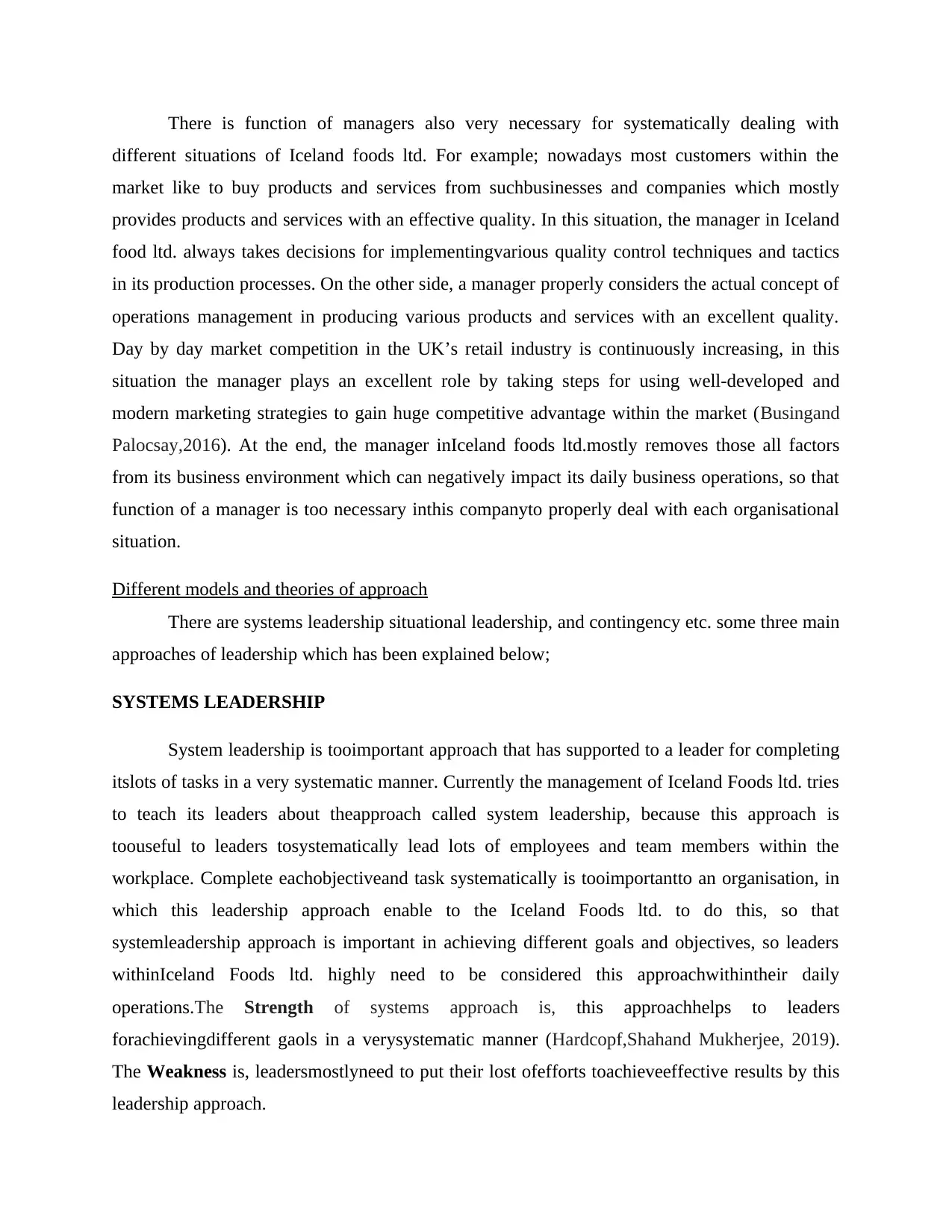
There is function of managers also very necessary for systematically dealing with
different situations of Iceland foods ltd. For example; nowadays most customers within the
market like to buy products and services from suchbusinesses and companies which mostly
provides products and services with an effective quality. In this situation, the manager in Iceland
food ltd. always takes decisions for implementingvarious quality control techniques and tactics
in its production processes. On the other side, a manager properly considers the actual concept of
operations management in producing various products and services with an excellent quality.
Day by day market competition in the UK’s retail industry is continuously increasing, in this
situation the manager plays an excellent role by taking steps for using well-developed and
modern marketing strategies to gain huge competitive advantage within the market (Busingand
Palocsay,2016). At the end, the manager inIceland foods ltd.mostly removes those all factors
from its business environment which can negatively impact its daily business operations, so that
function of a manager is too necessary inthis companyto properly deal with each organisational
situation.
Different models and theories of approach
There are systems leadership situational leadership, and contingency etc. some three main
approaches of leadership which has been explained below;
SYSTEMS LEADERSHIP
System leadership is tooimportant approach that has supported to a leader for completing
itslots of tasks in a very systematic manner. Currently the management of Iceland Foods ltd. tries
to teach its leaders about theapproach called system leadership, because this approach is
toouseful to leaders tosystematically lead lots of employees and team members within the
workplace. Complete eachobjectiveand task systematically is tooimportantto an organisation, in
which this leadership approach enable to the Iceland Foods ltd. to do this, so that
systemleadership approach is important in achieving different goals and objectives, so leaders
withinIceland Foods ltd. highly need to be considered this approachwithintheir daily
operations.The Strength of systems approach is, this approachhelps to leaders
forachievingdifferent gaols in a verysystematic manner (Hardcopf,Shahand Mukherjee, 2019).
The Weakness is, leadersmostlyneed to put their lost ofefforts toachieveeffective results by this
leadership approach.
different situations of Iceland foods ltd. For example; nowadays most customers within the
market like to buy products and services from suchbusinesses and companies which mostly
provides products and services with an effective quality. In this situation, the manager in Iceland
food ltd. always takes decisions for implementingvarious quality control techniques and tactics
in its production processes. On the other side, a manager properly considers the actual concept of
operations management in producing various products and services with an excellent quality.
Day by day market competition in the UK’s retail industry is continuously increasing, in this
situation the manager plays an excellent role by taking steps for using well-developed and
modern marketing strategies to gain huge competitive advantage within the market (Busingand
Palocsay,2016). At the end, the manager inIceland foods ltd.mostly removes those all factors
from its business environment which can negatively impact its daily business operations, so that
function of a manager is too necessary inthis companyto properly deal with each organisational
situation.
Different models and theories of approach
There are systems leadership situational leadership, and contingency etc. some three main
approaches of leadership which has been explained below;
SYSTEMS LEADERSHIP
System leadership is tooimportant approach that has supported to a leader for completing
itslots of tasks in a very systematic manner. Currently the management of Iceland Foods ltd. tries
to teach its leaders about theapproach called system leadership, because this approach is
toouseful to leaders tosystematically lead lots of employees and team members within the
workplace. Complete eachobjectiveand task systematically is tooimportantto an organisation, in
which this leadership approach enable to the Iceland Foods ltd. to do this, so that
systemleadership approach is important in achieving different goals and objectives, so leaders
withinIceland Foods ltd. highly need to be considered this approachwithintheir daily
operations.The Strength of systems approach is, this approachhelps to leaders
forachievingdifferent gaols in a verysystematic manner (Hardcopf,Shahand Mukherjee, 2019).
The Weakness is, leadersmostlyneed to put their lost ofefforts toachieveeffective results by this
leadership approach.
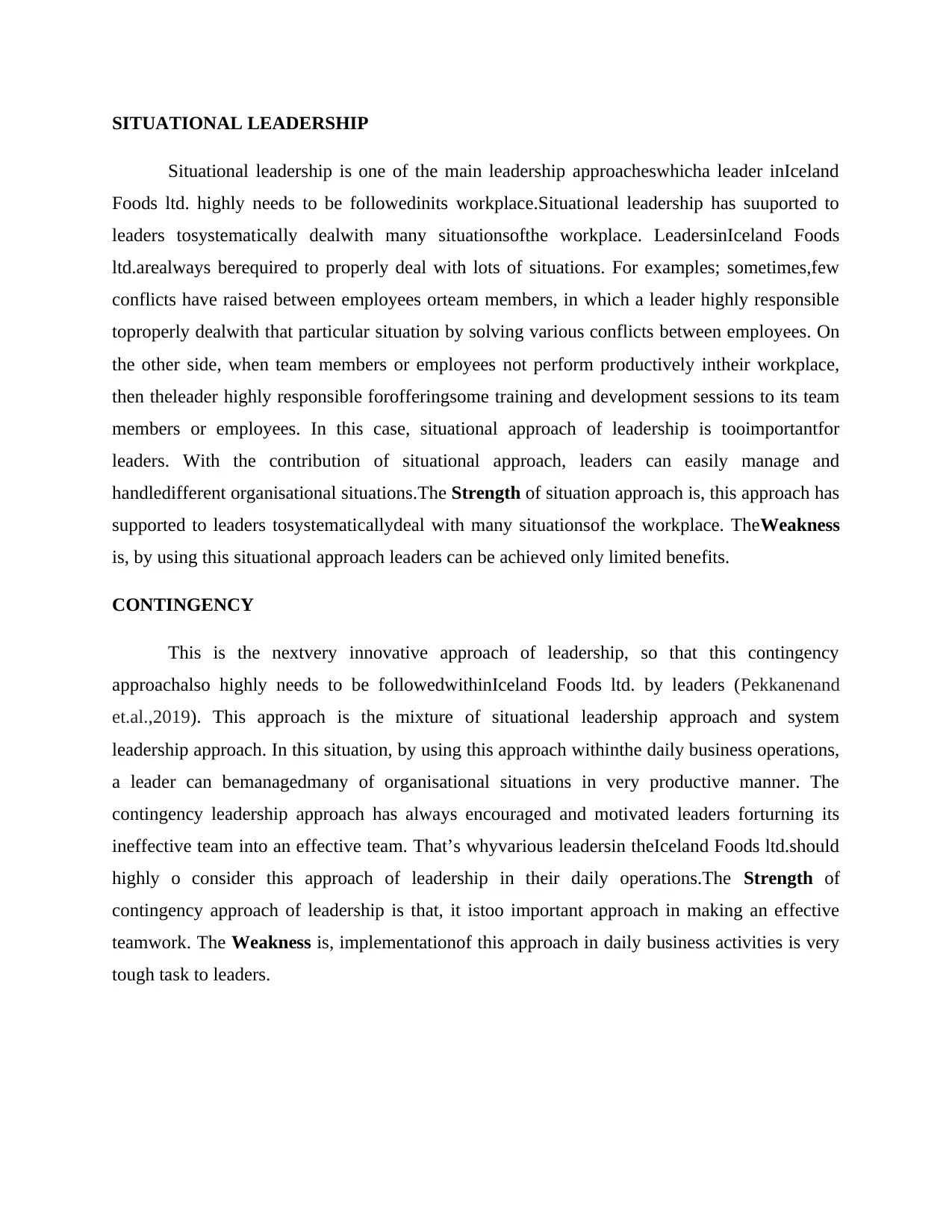
SITUATIONAL LEADERSHIP
Situational leadership is one of the main leadership approacheswhicha leader inIceland
Foods ltd. highly needs to be followedinits workplace.Situational leadership has suuported to
leaders tosystematically dealwith many situationsofthe workplace. LeadersinIceland Foods
ltd.arealways berequired to properly deal with lots of situations. For examples; sometimes,few
conflicts have raised between employees orteam members, in which a leader highly responsible
toproperly dealwith that particular situation by solving various conflicts between employees. On
the other side, when team members or employees not perform productively intheir workplace,
then theleader highly responsible forofferingsome training and development sessions to its team
members or employees. In this case, situational approach of leadership is tooimportantfor
leaders. With the contribution of situational approach, leaders can easily manage and
handledifferent organisational situations.The Strength of situation approach is, this approach has
supported to leaders tosystematicallydeal with many situationsof the workplace. TheWeakness
is, by using this situational approach leaders can be achieved only limited benefits.
CONTINGENCY
This is the nextvery innovative approach of leadership, so that this contingency
approachalso highly needs to be followedwithinIceland Foods ltd. by leaders (Pekkanenand
et.al.,2019). This approach is the mixture of situational leadership approach and system
leadership approach. In this situation, by using this approach withinthe daily business operations,
a leader can bemanagedmany of organisational situations in very productive manner. The
contingency leadership approach has always encouraged and motivated leaders forturning its
ineffective team into an effective team. That’s whyvarious leadersin theIceland Foods ltd.should
highly o consider this approach of leadership in their daily operations.The Strength of
contingency approach of leadership is that, it istoo important approach in making an effective
teamwork. The Weakness is, implementationof this approach in daily business activities is very
tough task to leaders.
Situational leadership is one of the main leadership approacheswhicha leader inIceland
Foods ltd. highly needs to be followedinits workplace.Situational leadership has suuported to
leaders tosystematically dealwith many situationsofthe workplace. LeadersinIceland Foods
ltd.arealways berequired to properly deal with lots of situations. For examples; sometimes,few
conflicts have raised between employees orteam members, in which a leader highly responsible
toproperly dealwith that particular situation by solving various conflicts between employees. On
the other side, when team members or employees not perform productively intheir workplace,
then theleader highly responsible forofferingsome training and development sessions to its team
members or employees. In this case, situational approach of leadership is tooimportantfor
leaders. With the contribution of situational approach, leaders can easily manage and
handledifferent organisational situations.The Strength of situation approach is, this approach has
supported to leaders tosystematicallydeal with many situationsof the workplace. TheWeakness
is, by using this situational approach leaders can be achieved only limited benefits.
CONTINGENCY
This is the nextvery innovative approach of leadership, so that this contingency
approachalso highly needs to be followedwithinIceland Foods ltd. by leaders (Pekkanenand
et.al.,2019). This approach is the mixture of situational leadership approach and system
leadership approach. In this situation, by using this approach withinthe daily business operations,
a leader can bemanagedmany of organisational situations in very productive manner. The
contingency leadership approach has always encouraged and motivated leaders forturning its
ineffective team into an effective team. That’s whyvarious leadersin theIceland Foods ltd.should
highly o consider this approach of leadership in their daily operations.The Strength of
contingency approach of leadership is that, it istoo important approach in making an effective
teamwork. The Weakness is, implementationof this approach in daily business activities is very
tough task to leaders.
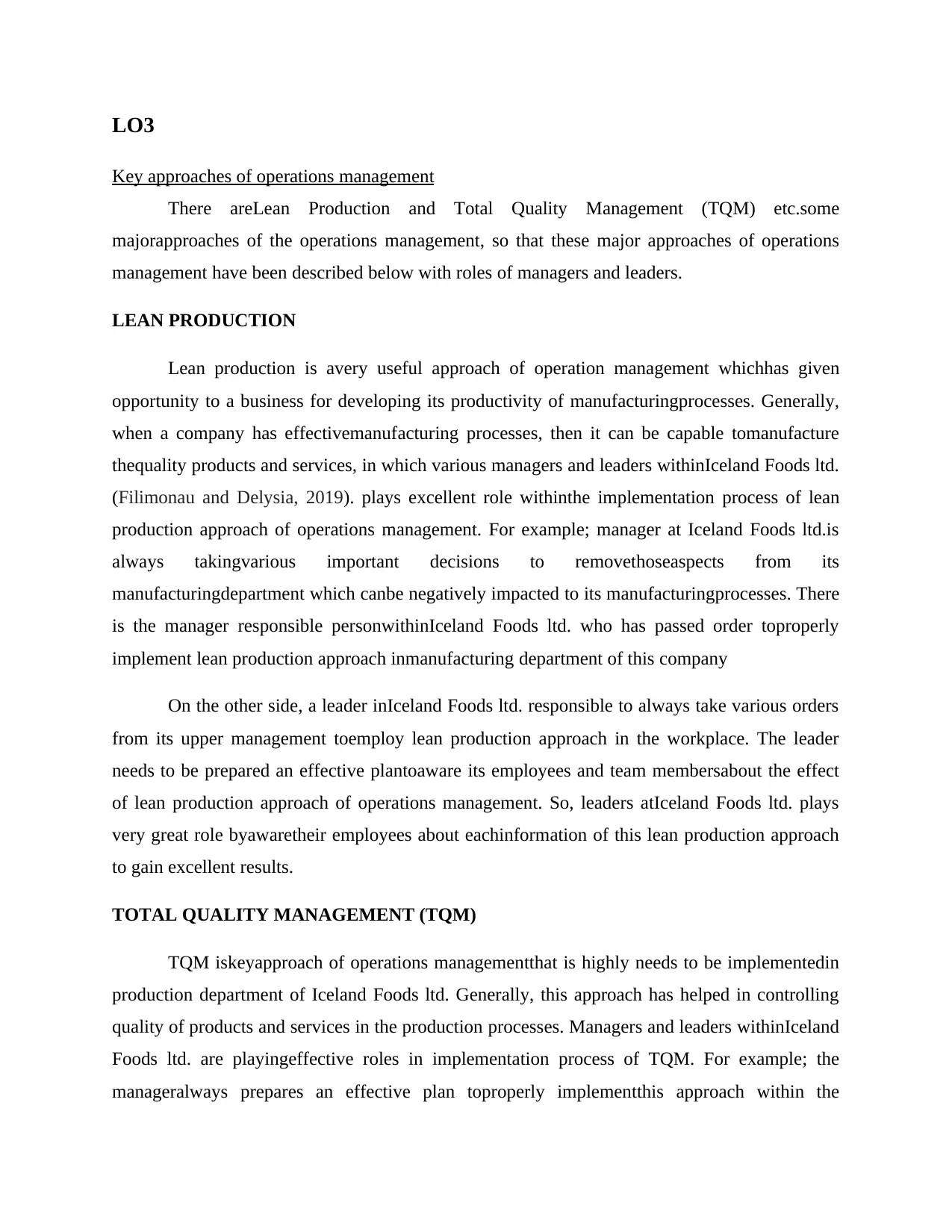
LO3
Key approaches of operations management
There areLean Production and Total Quality Management (TQM) etc.some
majorapproaches of the operations management, so that these major approaches of operations
management have been described below with roles of managers and leaders.
LEAN PRODUCTION
Lean production is avery useful approach of operation management whichhas given
opportunity to a business for developing its productivity of manufacturingprocesses. Generally,
when a company has effectivemanufacturing processes, then it can be capable tomanufacture
thequality products and services, in which various managers and leaders withinIceland Foods ltd.
(Filimonau and Delysia, 2019). plays excellent role withinthe implementation process of lean
production approach of operations management. For example; manager at Iceland Foods ltd.is
always takingvarious important decisions to removethoseaspects from its
manufacturingdepartment which canbe negatively impacted to its manufacturingprocesses. There
is the manager responsible personwithinIceland Foods ltd. who has passed order toproperly
implement lean production approach inmanufacturing department of this company
On the other side, a leader inIceland Foods ltd. responsible to always take various orders
from its upper management toemploy lean production approach in the workplace. The leader
needs to be prepared an effective plantoaware its employees and team membersabout the effect
of lean production approach of operations management. So, leaders atIceland Foods ltd. plays
very great role byawaretheir employees about eachinformation of this lean production approach
to gain excellent results.
TOTAL QUALITY MANAGEMENT (TQM)
TQM iskeyapproach of operations managementthat is highly needs to be implementedin
production department of Iceland Foods ltd. Generally, this approach has helped in controlling
quality of products and services in the production processes. Managers and leaders withinIceland
Foods ltd. are playingeffective roles in implementation process of TQM. For example; the
manageralways prepares an effective plan toproperly implementthis approach within the
Key approaches of operations management
There areLean Production and Total Quality Management (TQM) etc.some
majorapproaches of the operations management, so that these major approaches of operations
management have been described below with roles of managers and leaders.
LEAN PRODUCTION
Lean production is avery useful approach of operation management whichhas given
opportunity to a business for developing its productivity of manufacturingprocesses. Generally,
when a company has effectivemanufacturing processes, then it can be capable tomanufacture
thequality products and services, in which various managers and leaders withinIceland Foods ltd.
(Filimonau and Delysia, 2019). plays excellent role withinthe implementation process of lean
production approach of operations management. For example; manager at Iceland Foods ltd.is
always takingvarious important decisions to removethoseaspects from its
manufacturingdepartment which canbe negatively impacted to its manufacturingprocesses. There
is the manager responsible personwithinIceland Foods ltd. who has passed order toproperly
implement lean production approach inmanufacturing department of this company
On the other side, a leader inIceland Foods ltd. responsible to always take various orders
from its upper management toemploy lean production approach in the workplace. The leader
needs to be prepared an effective plantoaware its employees and team membersabout the effect
of lean production approach of operations management. So, leaders atIceland Foods ltd. plays
very great role byawaretheir employees about eachinformation of this lean production approach
to gain excellent results.
TOTAL QUALITY MANAGEMENT (TQM)
TQM iskeyapproach of operations managementthat is highly needs to be implementedin
production department of Iceland Foods ltd. Generally, this approach has helped in controlling
quality of products and services in the production processes. Managers and leaders withinIceland
Foods ltd. are playingeffective roles in implementation process of TQM. For example; the
manageralways prepares an effective plan toproperly implementthis approach within the
Paraphrase This Document
Need a fresh take? Get an instant paraphrase of this document with our AI Paraphraser
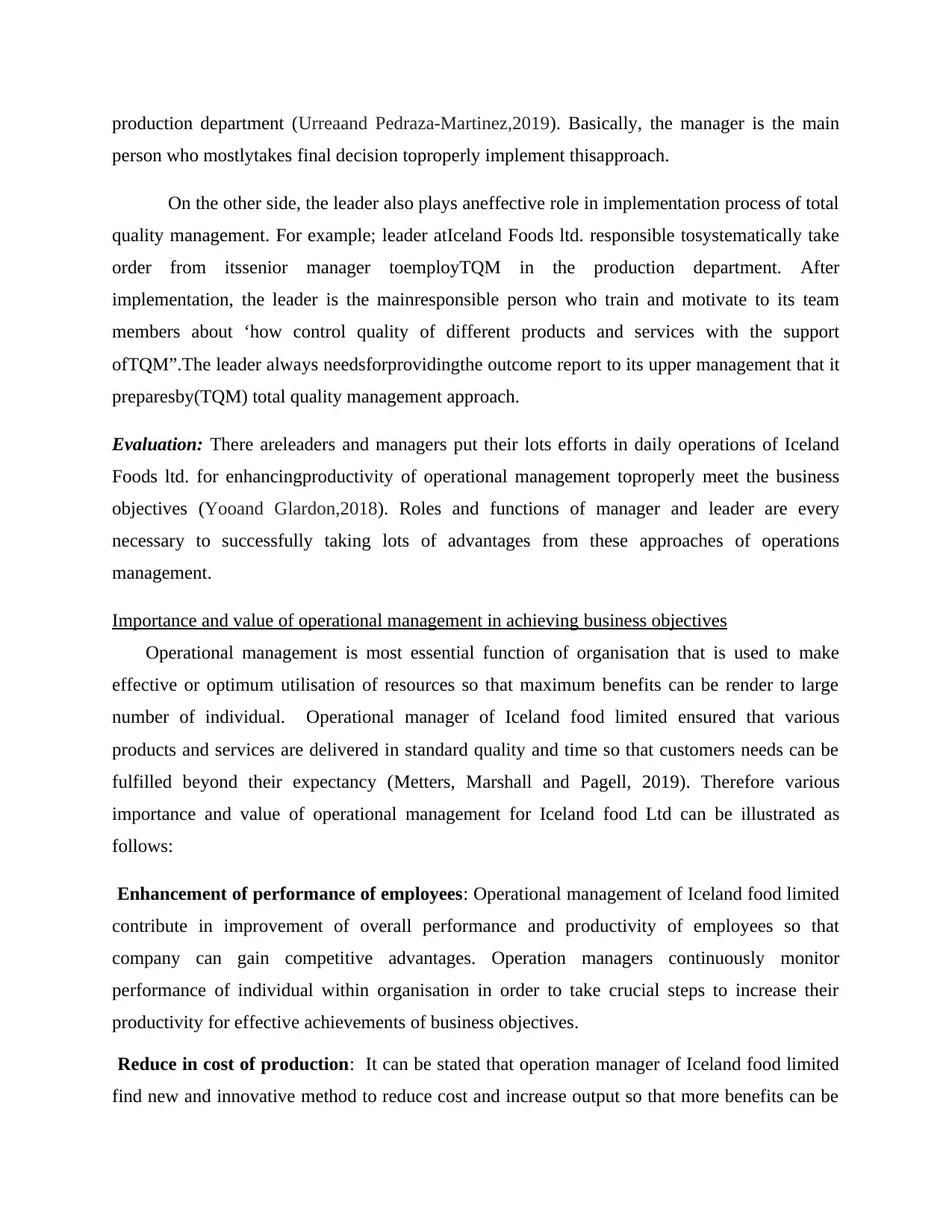
production department (Urreaand Pedraza-Martinez,2019). Basically, the manager is the main
person who mostlytakes final decision toproperly implement thisapproach.
On the other side, the leader also plays aneffective role in implementation process of total
quality management. For example; leader atIceland Foods ltd. responsible tosystematically take
order from itssenior manager toemployTQM in the production department. After
implementation, the leader is the mainresponsible person who train and motivate to its team
members about ‘how control quality of different products and services with the support
ofTQM”.The leader always needsforprovidingthe outcome report to its upper management that it
preparesby(TQM) total quality management approach.
Evaluation: There areleaders and managers put their lots efforts in daily operations of Iceland
Foods ltd. for enhancingproductivity of operational management toproperly meet the business
objectives (Yooand Glardon,2018). Roles and functions of manager and leader are every
necessary to successfully taking lots of advantages from these approaches of operations
management.
Importance and value of operational management in achieving business objectives
Operational management is most essential function of organisation that is used to make
effective or optimum utilisation of resources so that maximum benefits can be render to large
number of individual. Operational manager of Iceland food limited ensured that various
products and services are delivered in standard quality and time so that customers needs can be
fulfilled beyond their expectancy (Metters, Marshall and Pagell, 2019). Therefore various
importance and value of operational management for Iceland food Ltd can be illustrated as
follows:
Enhancement of performance of employees: Operational management of Iceland food limited
contribute in improvement of overall performance and productivity of employees so that
company can gain competitive advantages. Operation managers continuously monitor
performance of individual within organisation in order to take crucial steps to increase their
productivity for effective achievements of business objectives.
Reduce in cost of production: It can be stated that operation manager of Iceland food limited
find new and innovative method to reduce cost and increase output so that more benefits can be
person who mostlytakes final decision toproperly implement thisapproach.
On the other side, the leader also plays aneffective role in implementation process of total
quality management. For example; leader atIceland Foods ltd. responsible tosystematically take
order from itssenior manager toemployTQM in the production department. After
implementation, the leader is the mainresponsible person who train and motivate to its team
members about ‘how control quality of different products and services with the support
ofTQM”.The leader always needsforprovidingthe outcome report to its upper management that it
preparesby(TQM) total quality management approach.
Evaluation: There areleaders and managers put their lots efforts in daily operations of Iceland
Foods ltd. for enhancingproductivity of operational management toproperly meet the business
objectives (Yooand Glardon,2018). Roles and functions of manager and leader are every
necessary to successfully taking lots of advantages from these approaches of operations
management.
Importance and value of operational management in achieving business objectives
Operational management is most essential function of organisation that is used to make
effective or optimum utilisation of resources so that maximum benefits can be render to large
number of individual. Operational manager of Iceland food limited ensured that various
products and services are delivered in standard quality and time so that customers needs can be
fulfilled beyond their expectancy (Metters, Marshall and Pagell, 2019). Therefore various
importance and value of operational management for Iceland food Ltd can be illustrated as
follows:
Enhancement of performance of employees: Operational management of Iceland food limited
contribute in improvement of overall performance and productivity of employees so that
company can gain competitive advantages. Operation managers continuously monitor
performance of individual within organisation in order to take crucial steps to increase their
productivity for effective achievements of business objectives.
Reduce in cost of production: It can be stated that operation manager of Iceland food limited
find new and innovative method to reduce cost and increase output so that more benefits can be
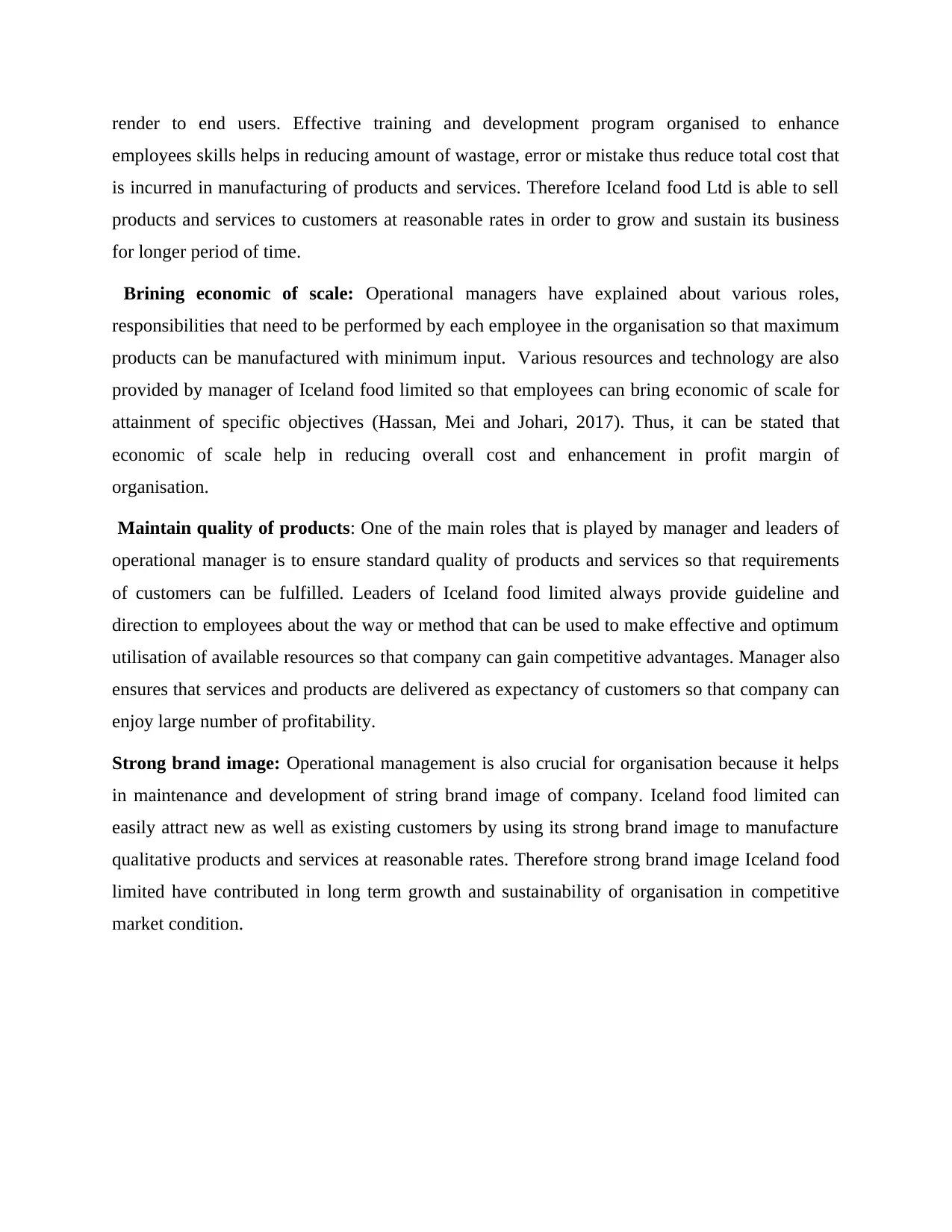
render to end users. Effective training and development program organised to enhance
employees skills helps in reducing amount of wastage, error or mistake thus reduce total cost that
is incurred in manufacturing of products and services. Therefore Iceland food Ltd is able to sell
products and services to customers at reasonable rates in order to grow and sustain its business
for longer period of time.
Brining economic of scale: Operational managers have explained about various roles,
responsibilities that need to be performed by each employee in the organisation so that maximum
products can be manufactured with minimum input. Various resources and technology are also
provided by manager of Iceland food limited so that employees can bring economic of scale for
attainment of specific objectives (Hassan, Mei and Johari, 2017). Thus, it can be stated that
economic of scale help in reducing overall cost and enhancement in profit margin of
organisation.
Maintain quality of products: One of the main roles that is played by manager and leaders of
operational manager is to ensure standard quality of products and services so that requirements
of customers can be fulfilled. Leaders of Iceland food limited always provide guideline and
direction to employees about the way or method that can be used to make effective and optimum
utilisation of available resources so that company can gain competitive advantages. Manager also
ensures that services and products are delivered as expectancy of customers so that company can
enjoy large number of profitability.
Strong brand image: Operational management is also crucial for organisation because it helps
in maintenance and development of string brand image of company. Iceland food limited can
easily attract new as well as existing customers by using its strong brand image to manufacture
qualitative products and services at reasonable rates. Therefore strong brand image Iceland food
limited have contributed in long term growth and sustainability of organisation in competitive
market condition.
employees skills helps in reducing amount of wastage, error or mistake thus reduce total cost that
is incurred in manufacturing of products and services. Therefore Iceland food Ltd is able to sell
products and services to customers at reasonable rates in order to grow and sustain its business
for longer period of time.
Brining economic of scale: Operational managers have explained about various roles,
responsibilities that need to be performed by each employee in the organisation so that maximum
products can be manufactured with minimum input. Various resources and technology are also
provided by manager of Iceland food limited so that employees can bring economic of scale for
attainment of specific objectives (Hassan, Mei and Johari, 2017). Thus, it can be stated that
economic of scale help in reducing overall cost and enhancement in profit margin of
organisation.
Maintain quality of products: One of the main roles that is played by manager and leaders of
operational manager is to ensure standard quality of products and services so that requirements
of customers can be fulfilled. Leaders of Iceland food limited always provide guideline and
direction to employees about the way or method that can be used to make effective and optimum
utilisation of available resources so that company can gain competitive advantages. Manager also
ensures that services and products are delivered as expectancy of customers so that company can
enjoy large number of profitability.
Strong brand image: Operational management is also crucial for organisation because it helps
in maintenance and development of string brand image of company. Iceland food limited can
easily attract new as well as existing customers by using its strong brand image to manufacture
qualitative products and services at reasonable rates. Therefore strong brand image Iceland food
limited have contributed in long term growth and sustainability of organisation in competitive
market condition.
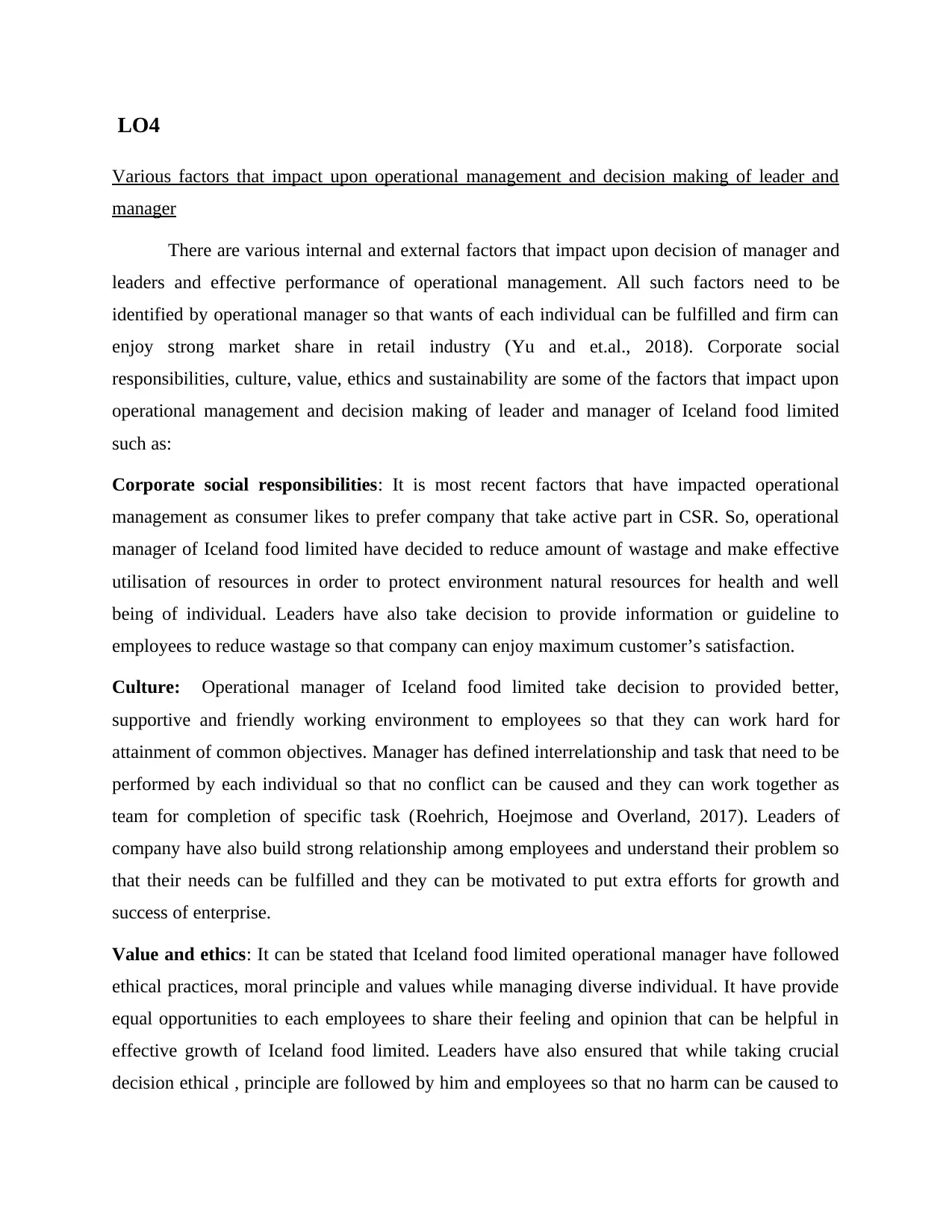
LO4
Various factors that impact upon operational management and decision making of leader and
manager
There are various internal and external factors that impact upon decision of manager and
leaders and effective performance of operational management. All such factors need to be
identified by operational manager so that wants of each individual can be fulfilled and firm can
enjoy strong market share in retail industry (Yu and et.al., 2018). Corporate social
responsibilities, culture, value, ethics and sustainability are some of the factors that impact upon
operational management and decision making of leader and manager of Iceland food limited
such as:
Corporate social responsibilities: It is most recent factors that have impacted operational
management as consumer likes to prefer company that take active part in CSR. So, operational
manager of Iceland food limited have decided to reduce amount of wastage and make effective
utilisation of resources in order to protect environment natural resources for health and well
being of individual. Leaders have also take decision to provide information or guideline to
employees to reduce wastage so that company can enjoy maximum customer’s satisfaction.
Culture: Operational manager of Iceland food limited take decision to provided better,
supportive and friendly working environment to employees so that they can work hard for
attainment of common objectives. Manager has defined interrelationship and task that need to be
performed by each individual so that no conflict can be caused and they can work together as
team for completion of specific task (Roehrich, Hoejmose and Overland, 2017). Leaders of
company have also build strong relationship among employees and understand their problem so
that their needs can be fulfilled and they can be motivated to put extra efforts for growth and
success of enterprise.
Value and ethics: It can be stated that Iceland food limited operational manager have followed
ethical practices, moral principle and values while managing diverse individual. It have provide
equal opportunities to each employees to share their feeling and opinion that can be helpful in
effective growth of Iceland food limited. Leaders have also ensured that while taking crucial
decision ethical , principle are followed by him and employees so that no harm can be caused to
Various factors that impact upon operational management and decision making of leader and
manager
There are various internal and external factors that impact upon decision of manager and
leaders and effective performance of operational management. All such factors need to be
identified by operational manager so that wants of each individual can be fulfilled and firm can
enjoy strong market share in retail industry (Yu and et.al., 2018). Corporate social
responsibilities, culture, value, ethics and sustainability are some of the factors that impact upon
operational management and decision making of leader and manager of Iceland food limited
such as:
Corporate social responsibilities: It is most recent factors that have impacted operational
management as consumer likes to prefer company that take active part in CSR. So, operational
manager of Iceland food limited have decided to reduce amount of wastage and make effective
utilisation of resources in order to protect environment natural resources for health and well
being of individual. Leaders have also take decision to provide information or guideline to
employees to reduce wastage so that company can enjoy maximum customer’s satisfaction.
Culture: Operational manager of Iceland food limited take decision to provided better,
supportive and friendly working environment to employees so that they can work hard for
attainment of common objectives. Manager has defined interrelationship and task that need to be
performed by each individual so that no conflict can be caused and they can work together as
team for completion of specific task (Roehrich, Hoejmose and Overland, 2017). Leaders of
company have also build strong relationship among employees and understand their problem so
that their needs can be fulfilled and they can be motivated to put extra efforts for growth and
success of enterprise.
Value and ethics: It can be stated that Iceland food limited operational manager have followed
ethical practices, moral principle and values while managing diverse individual. It have provide
equal opportunities to each employees to share their feeling and opinion that can be helpful in
effective growth of Iceland food limited. Leaders have also ensured that while taking crucial
decision ethical , principle are followed by him and employees so that no harm can be caused to
Secure Best Marks with AI Grader
Need help grading? Try our AI Grader for instant feedback on your assignments.
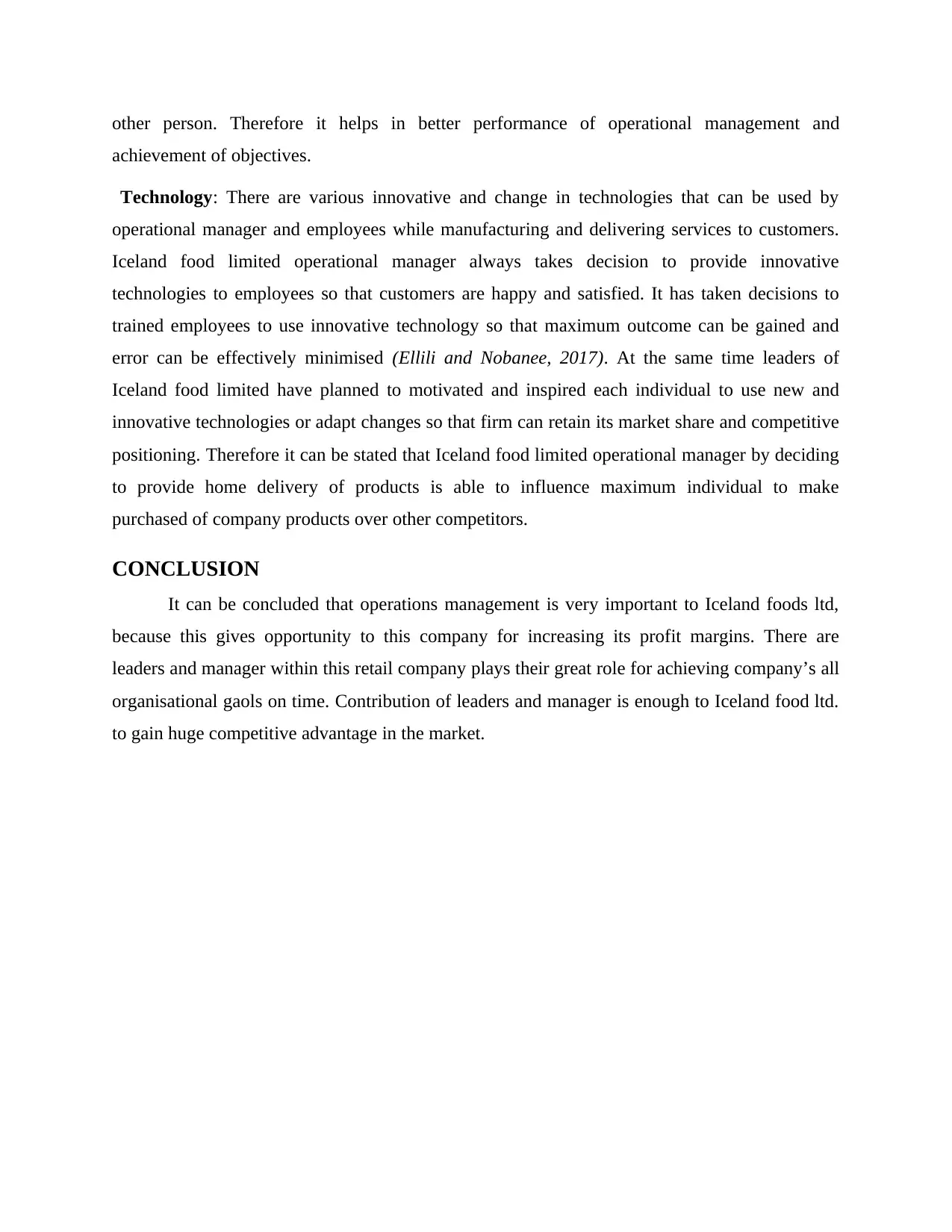
other person. Therefore it helps in better performance of operational management and
achievement of objectives.
Technology: There are various innovative and change in technologies that can be used by
operational manager and employees while manufacturing and delivering services to customers.
Iceland food limited operational manager always takes decision to provide innovative
technologies to employees so that customers are happy and satisfied. It has taken decisions to
trained employees to use innovative technology so that maximum outcome can be gained and
error can be effectively minimised (Ellili and Nobanee, 2017). At the same time leaders of
Iceland food limited have planned to motivated and inspired each individual to use new and
innovative technologies or adapt changes so that firm can retain its market share and competitive
positioning. Therefore it can be stated that Iceland food limited operational manager by deciding
to provide home delivery of products is able to influence maximum individual to make
purchased of company products over other competitors.
CONCLUSION
It can be concluded that operations management is very important to Iceland foods ltd,
because this gives opportunity to this company for increasing its profit margins. There are
leaders and manager within this retail company plays their great role for achieving company’s all
organisational gaols on time. Contribution of leaders and manager is enough to Iceland food ltd.
to gain huge competitive advantage in the market.
achievement of objectives.
Technology: There are various innovative and change in technologies that can be used by
operational manager and employees while manufacturing and delivering services to customers.
Iceland food limited operational manager always takes decision to provide innovative
technologies to employees so that customers are happy and satisfied. It has taken decisions to
trained employees to use innovative technology so that maximum outcome can be gained and
error can be effectively minimised (Ellili and Nobanee, 2017). At the same time leaders of
Iceland food limited have planned to motivated and inspired each individual to use new and
innovative technologies or adapt changes so that firm can retain its market share and competitive
positioning. Therefore it can be stated that Iceland food limited operational manager by deciding
to provide home delivery of products is able to influence maximum individual to make
purchased of company products over other competitors.
CONCLUSION
It can be concluded that operations management is very important to Iceland foods ltd,
because this gives opportunity to this company for increasing its profit margins. There are
leaders and manager within this retail company plays their great role for achieving company’s all
organisational gaols on time. Contribution of leaders and manager is enough to Iceland food ltd.
to gain huge competitive advantage in the market.
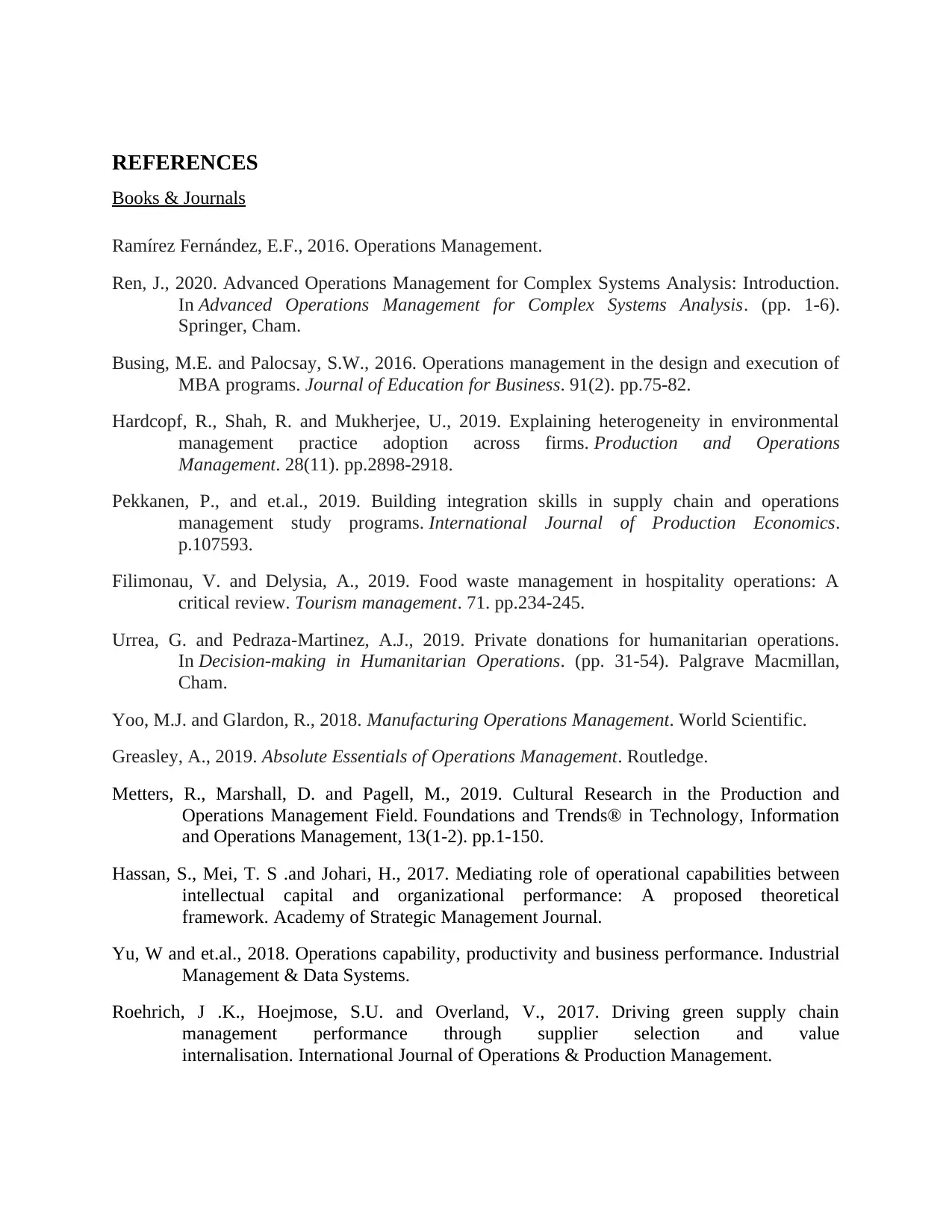
REFERENCES
Books & Journals
Ramírez Fernández, E.F., 2016. Operations Management.
Ren, J., 2020. Advanced Operations Management for Complex Systems Analysis: Introduction.
In Advanced Operations Management for Complex Systems Analysis. (pp. 1-6).
Springer, Cham.
Busing, M.E. and Palocsay, S.W., 2016. Operations management in the design and execution of
MBA programs. Journal of Education for Business. 91(2). pp.75-82.
Hardcopf, R., Shah, R. and Mukherjee, U., 2019. Explaining heterogeneity in environmental
management practice adoption across firms. Production and Operations
Management. 28(11). pp.2898-2918.
Pekkanen, P., and et.al., 2019. Building integration skills in supply chain and operations
management study programs. International Journal of Production Economics.
p.107593.
Filimonau, V. and Delysia, A., 2019. Food waste management in hospitality operations: A
critical review. Tourism management. 71. pp.234-245.
Urrea, G. and Pedraza-Martinez, A.J., 2019. Private donations for humanitarian operations.
In Decision-making in Humanitarian Operations. (pp. 31-54). Palgrave Macmillan,
Cham.
Yoo, M.J. and Glardon, R., 2018. Manufacturing Operations Management. World Scientific.
Greasley, A., 2019. Absolute Essentials of Operations Management. Routledge.
Metters, R., Marshall, D. and Pagell, M., 2019. Cultural Research in the Production and
Operations Management Field. Foundations and Trends® in Technology, Information
and Operations Management, 13(1-2). pp.1-150.
Hassan, S., Mei, T. S .and Johari, H., 2017. Mediating role of operational capabilities between
intellectual capital and organizational performance: A proposed theoretical
framework. Academy of Strategic Management Journal.
Yu, W and et.al., 2018. Operations capability, productivity and business performance. Industrial
Management & Data Systems.
Roehrich, J .K., Hoejmose, S.U. and Overland, V., 2017. Driving green supply chain
management performance through supplier selection and value
internalisation. International Journal of Operations & Production Management.
Books & Journals
Ramírez Fernández, E.F., 2016. Operations Management.
Ren, J., 2020. Advanced Operations Management for Complex Systems Analysis: Introduction.
In Advanced Operations Management for Complex Systems Analysis. (pp. 1-6).
Springer, Cham.
Busing, M.E. and Palocsay, S.W., 2016. Operations management in the design and execution of
MBA programs. Journal of Education for Business. 91(2). pp.75-82.
Hardcopf, R., Shah, R. and Mukherjee, U., 2019. Explaining heterogeneity in environmental
management practice adoption across firms. Production and Operations
Management. 28(11). pp.2898-2918.
Pekkanen, P., and et.al., 2019. Building integration skills in supply chain and operations
management study programs. International Journal of Production Economics.
p.107593.
Filimonau, V. and Delysia, A., 2019. Food waste management in hospitality operations: A
critical review. Tourism management. 71. pp.234-245.
Urrea, G. and Pedraza-Martinez, A.J., 2019. Private donations for humanitarian operations.
In Decision-making in Humanitarian Operations. (pp. 31-54). Palgrave Macmillan,
Cham.
Yoo, M.J. and Glardon, R., 2018. Manufacturing Operations Management. World Scientific.
Greasley, A., 2019. Absolute Essentials of Operations Management. Routledge.
Metters, R., Marshall, D. and Pagell, M., 2019. Cultural Research in the Production and
Operations Management Field. Foundations and Trends® in Technology, Information
and Operations Management, 13(1-2). pp.1-150.
Hassan, S., Mei, T. S .and Johari, H., 2017. Mediating role of operational capabilities between
intellectual capital and organizational performance: A proposed theoretical
framework. Academy of Strategic Management Journal.
Yu, W and et.al., 2018. Operations capability, productivity and business performance. Industrial
Management & Data Systems.
Roehrich, J .K., Hoejmose, S.U. and Overland, V., 2017. Driving green supply chain
management performance through supplier selection and value
internalisation. International Journal of Operations & Production Management.
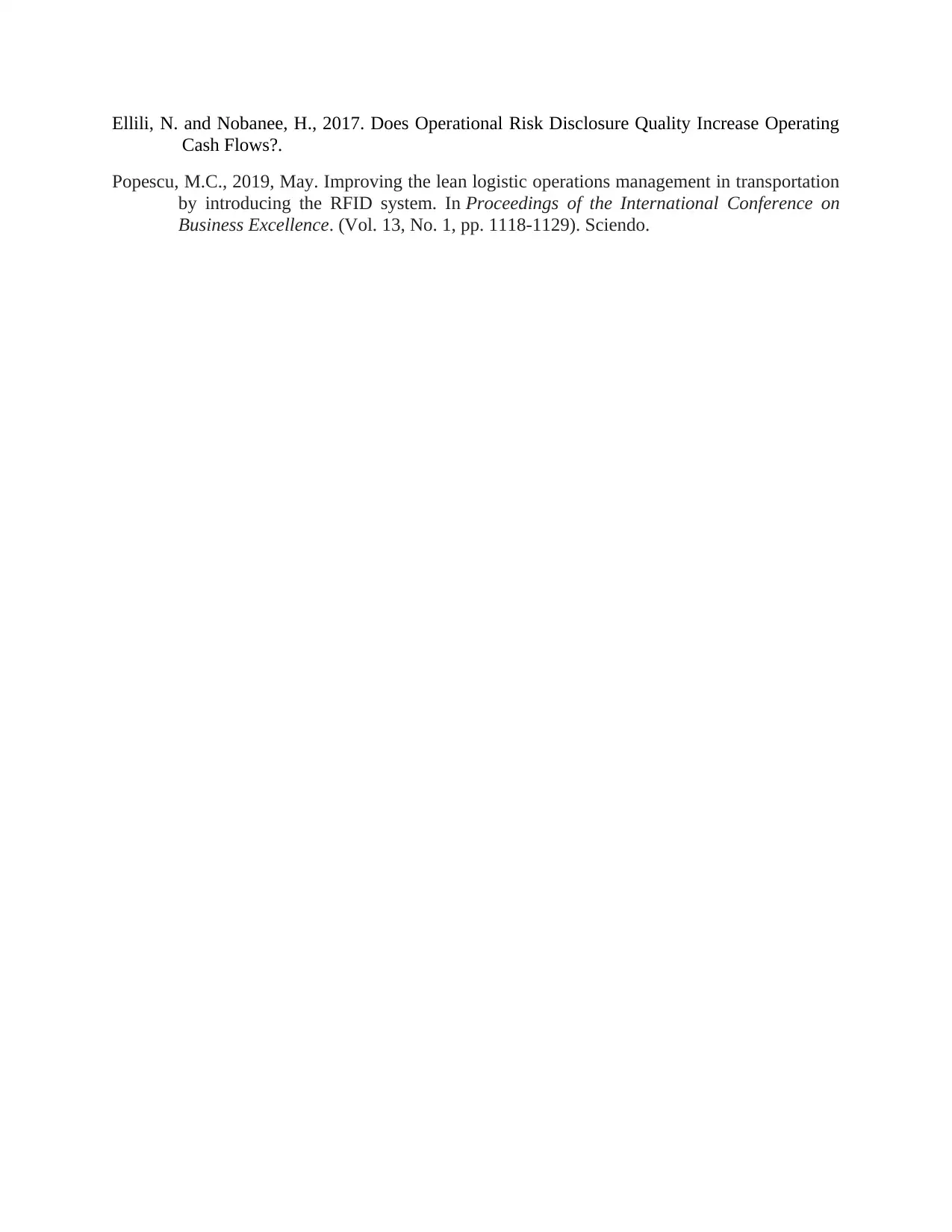
Ellili, N. and Nobanee, H., 2017. Does Operational Risk Disclosure Quality Increase Operating
Cash Flows?.
Popescu, M.C., 2019, May. Improving the lean logistic operations management in transportation
by introducing the RFID system. In Proceedings of the International Conference on
Business Excellence. (Vol. 13, No. 1, pp. 1118-1129). Sciendo.
Cash Flows?.
Popescu, M.C., 2019, May. Improving the lean logistic operations management in transportation
by introducing the RFID system. In Proceedings of the International Conference on
Business Excellence. (Vol. 13, No. 1, pp. 1118-1129). Sciendo.
1 out of 13
Related Documents
Your All-in-One AI-Powered Toolkit for Academic Success.
+13062052269
info@desklib.com
Available 24*7 on WhatsApp / Email
![[object Object]](/_next/static/media/star-bottom.7253800d.svg)
Unlock your academic potential
© 2024 | Zucol Services PVT LTD | All rights reserved.





